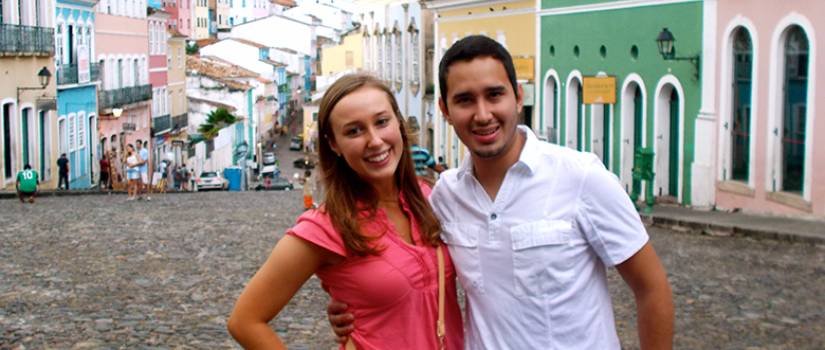Establishing Business Relationships Abroad
By Eleanor Mooney
Jacqueline Fasulo and Luis Nares Jaramillo didn’t spend their time at USC just networking in Columbia. Instead, the Honors finance students traveled extensively throughout Latin America, working to better understand the area’s business culture and help establish business relationships between Latin American and growing American companies.
“It makes sense for businesses to target Latin America, because it’s a developing region that contains a huge market for expanding businesses,” said Fasulo, who, like Nares, graduated in May 2016.
However, a problem arises with the differing business practices that exist between American and Latin American cultures. Many American businesses don’t understand how Latin American companies operate, which causes difficulties when they attempt to expand in the region. For example, while business meetings in America occur promptly at an appointed hour, in Latin America these times are much more flexible, sometimes occurring up to an hour after the agreed-upon time.
“It’s not a feasible option for many American companies to connect with Latin American ones because of the cultural and language barriers,” Fasulo noted. “It makes communicating an extremely arduous and time-consuming process, and success in the region difficult.”
This was the problem Transfer Point, a dietary supplement company based in Little Mountain, SC, encountered in Latin America. Company officials hired Fasulo and Nares as intern directors of Latin American trade development their sophomore year, because of their knowledge and experience with Latin America. Both speak French, Portuguese and Spanish, while Nares also speaks Mandarin. Fasulo, who grew up in Ellicott City, MD has taken a Business in Latin America Maymester in Argentina, and has also visited Panama, Mexico, Argentina, Chile, and Brazil. An international student, Nares grew up in Torreon, Mexico, and has traveled to Taiwan, Brazil, Argentina, Uruguay, and Panama.
“People often think of Latin America as one region,” Nares pointed out. “But it’s really a consortium of different countries with different cultures and ways of doing things. It’s interesting to see how Americans’ view of Latin America mesh with this. Also, I love how different Latin American values are from American ones. It’s exciting to see how happiness isn’t measured in material goods but rather who people spend their time with.”
Fasulo and Nares worked with Transfer Point for three years, aiding the company’s expansion into Panama and Mexico. They traveled to Mexico three times, establishing relationships and working with Dorette Coetsee with the U.S. Foreign and Commercial Service, who is based at the Moore School of Business. They set up Gold Keys meetings to discuss potential distributorships with companies.
“This year, we succeeded in negotiating a distributorship with a company based in Mexico,” Nares said. He and Fasulo are working to establish another distributorship in Ecuador. “It’s probably one of our biggest accomplishments at USC.”
Fasulo and Nares used their senior thesis to share their experiences with Transfer Point and Latin American businesses. Specifically, they developed a handbook, “Doing Business in Latin America: How to Close the Deal Pronto,” about the unique cultural business practices one would encounter. The experience-based guidebook is divided into specific country sections on history, culture, and political stability, while also discussing broad regional business etiquette.
“Dr. Kimberly Simmons was invaluable to us throughout our thesis’s development,” Fasulo said. “She was our thesis director and provided an anthropologic view, helping us to explain our findings in an easy-to-understand manner.”
As part of their thesis, the pair also held an expo at the Darla Moore School of Business, explaining their findings and providing cultural demonstrations.
“In one demonstration, we had both our fathers put on cologne. Luis’ father, who’s Mexican, put on a ton, but my dad, who’s American, just dabbed it on,” Fasulo recalled. “It’s also much more common to ask very personal questions that people sometimes sue over in the States in Latin American business meetings. People were really surprised by this.”
Fasulo is working as a credit risk associate at KPMG, one of the “Big Four” global auditing companies that provides professional services, including tax, audit, and advisory services, in the Washington, DC, area. She hopes later to apply the knowledge she gained at USC with companies that are expanding internationally in Latin America. Nares also is working with KPMG, as a global strategy group associate in Mexico City.
“You learn a lot of theory in university, but when you graduate, you need to gain some hard skills and know-how to put that theory into practice,” Nares said. “You can’t just know how to perform, but you also need to learn how to work with people in a way you’ve never had to before.”
Pictured: Fasulo and Nares at the Pelourinho in Salvador da Bahía, Brazil during an Honors College Maymester program, Culture and Experience in the African Diaspora, which was led by Dr. Kimberly Simmons, Associate Dean of the Honors College.
